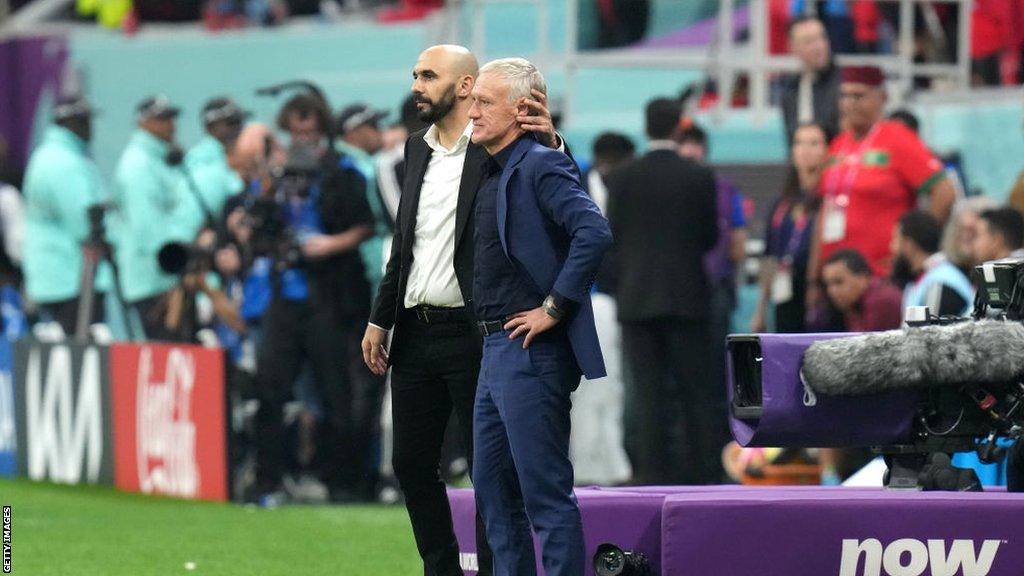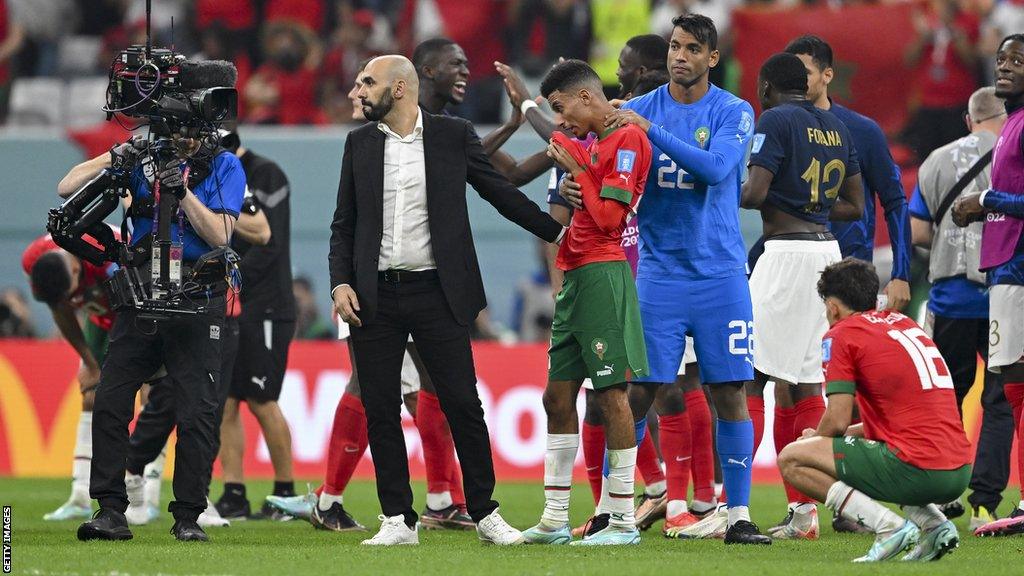Walid Regragui: 'When will the first Arab or African coach get a job in the Premier League?'
- Published

Walid Regragui (left) only took over as Morocco manager three months before their historic run to the semi-finals at Qatar 2022 where they lost to a France team coached by Didier Deschamps (right)
Morocco head coach Walid Regragui has set his sights on becoming the first Arab Muslim manager in the Premier League.
Regragui was at the helm as the Atlas Lions made history last year by becoming the first African nation to reach a World Cup semi-final.
Despite losing to France, the 47-year-old has revealed his long-term personal ambitions include England's top flight.
"Of course, it's a goal I've had since the beginning of my career. I build it slowly," he told the BBC World Service, before asking, "When will the first Arab or African coach get a job in the Premier League?"
"We have people of colour but they are European. The World Cup showed we were capable but we're waiting for a club president, owner or chairman who has the courage to give us the chance."
Two managers born in Africa have lost their jobs in the top two divisions of English football this season.
Former France and Arsenal midfielder Patrick Vieira, who was born in Senegal, parted company with Crystal Palace in March, with the Eagles 12th in the Premier League at the time. Vieira had previously said he was "troubled" by the lack of black managers in both the men's and women's top flights in England.
Another ex Arsenal player, Ivory Coast's Kolo Toure, was sacked by Championship strugglers Wigan in January after only nine games in charge.
"We are starting to have black coaches in the Premier League and in France," Regragui continued.
"Unfortunately, it's always complicated for African coaches in Europe. There is this lack of confidence, which can be legitimate even if I don't agree with it.
"I grew up in France, I played at the top level. I know I am capable of coaching at a very high level, which is in the Premier League, in France or in Spain.
"The truth is that I am lucky to have made this World Cup. But which club owner, president or chairman will have the courage to come and bet on an African coach?
"I do think football is changing though."
A 'stronghold in Africa'
For now, the immediate focus remains the 2024 Africa Cup of Nations, with Regragui previously stating Morocco cannot be "kings of the world before being kings of our continent".
The Atlas Lions were knocked out of the 2021 edition at the quarter-final stage by Egypt.
Regragui's predecessor, Vahid Halilhodzic, then parted ways with Morocco just three months before Qatar 2022 following a series of high-profile fall-outs, including with star player Hakim Ziyech.

Regragui won 45 caps for Morocco and played in the French top flight for Toulouse
Enter Regragui who had just led Wydad Casablanca to success in both the Moroccan domestic league and African Champions League.
"It was a surprise. Being manager of the national team was not an objective I had right away," Regragui revealed.
"It came quickly for me when I would have preferred to have experience in Europe first.
"It's been an extraordinary year for me and my staff. We've worked hard to realise this dream and it's magnificent.
"We gave a lot of happiness to Moroccans, to the Africans and at this World Cup. We were a bit of a surprise team and people liked to see us giving our absolute maximum.
"We must be winners, we must have this state of mind. That's why I put pressure on myself to set an example. And that's why, famously here in Morocco, I have said that if we don't go to the semi-finals at the next Cup of Nations, I will resign.
"In Morocco, we want to be a stronghold in Africa. And when we dominate our continent we can also dominate the world."
Fame and coffee
Should Regragui achieve his ambition of managing in the Premier League, he might have to learn how to be his own barista.
The former full-back, who began his career in the city of his birth with Racing Paris before joining Toulouse and won 45 caps for Morocco, is already having to adapt to the trappings of fame - as are his family.
"It's difficult for me to have a coffee in Rabat," he admitted.
"My wife told me, 'Why did you take the team to the semi-finals of the World Cup? You brought yourself more problems!'
"That's how it is. The most important thing for me is to see happy people in my country still; two or three months after the World Cup they are still living this dream.
"Sport has a value that is important, to give dreams to children and young people.
"That is what we are trying to achieve at the moment with the national team. If it prevents me from drinking coffee, it's not a problem."